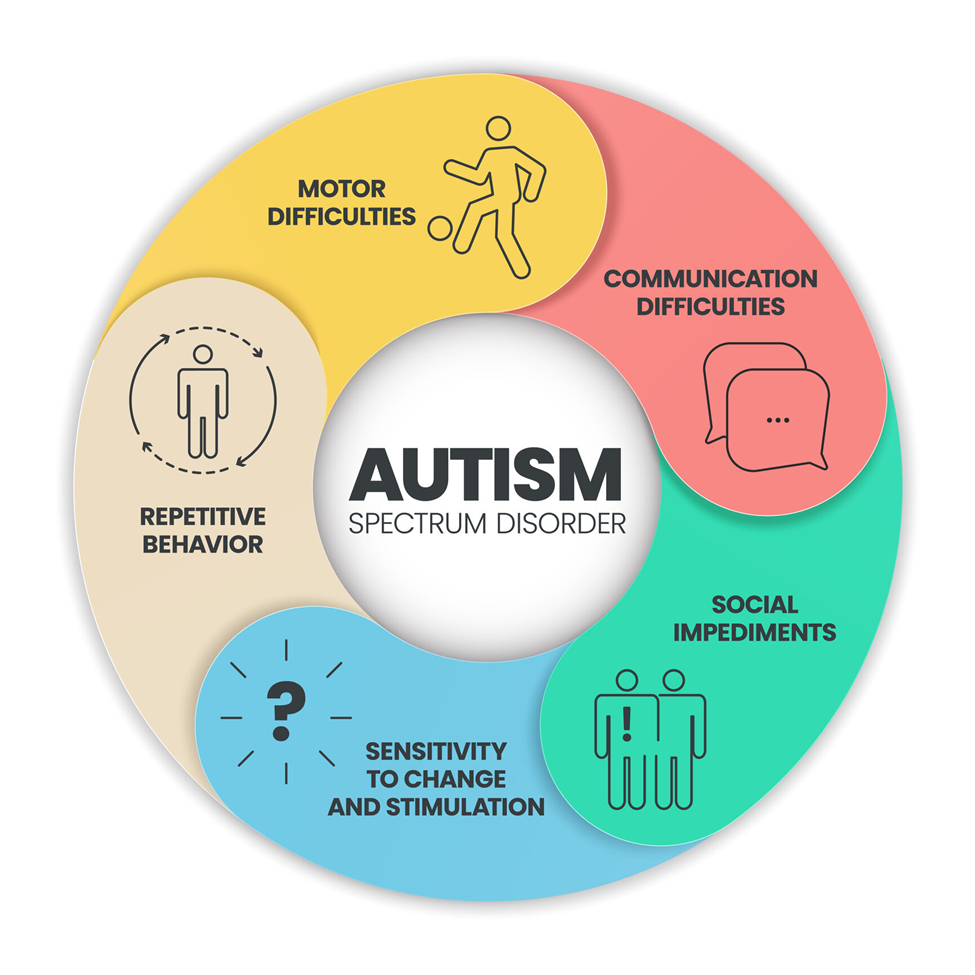A nurse is caring for a 4-year-old child who has autism spectrum disorder. Which of the following behaviors should the nurse expect? (Select all that apply)
Lack of eye contact
Inability to play quietly
Constant spinning of a toy
Withdrawal from physical contact
Correct Answer : A,C,D
A. Lack of eye contact: Difficulty with eye contact is a common characteristic of ASD. Many individuals with ASD may have challenges in establishing or maintaining eye contact during social interactions.
B. Inability to play quietly: Individuals with ASD may engage in repetitive or stereotyped behaviors, including noisy or disruptive play. However, the inability to play quietly is not universally present in all individuals with ASD.
C. Constant spinning of a toy: Repetitive or stereotyped movements, such as spinning objects or repetitive hand movements, are common behaviors observed in individuals with ASD. This behavior is often referred to as "stimming" or self-stimulatory behavior.
D. Withdrawal from physical contact: Sensory sensitivities are common in individuals with ASD, and some may be hypersensitive to touch or physical contact. As a result, they may withdraw from or avoid physical contact with others.
E. Repeated voiding in clothes: Repeated voiding in clothes is not typically considered a core feature of ASD. However, some individuals with ASD may have challenges with toileting, including difficulties with toilet training or sensory sensitivities related to bathroom routines.

Nursing Test Bank
Naxlex Comprehensive Predictor Exams
Related Questions
Correct Answer is D
Explanation
A. Refer the client to a support group for survivors of suicide: While support groups can be valuable resources for individuals who have lost loved ones to suicide, it may not be the most immediate or appropriate action to take first. The client may not be ready to engage in group support until her immediate needs are addressed.
B. Offer to contact the client’s family or support system: This option demonstrates empathy and practical support by offering assistance in reaching out to the client's family or support system. It can help ensure that the client has immediate emotional support and assistance with practical matters.
C. Inform the client that feelings of guilt are often felt by survivors of suicide: While providing information about common experiences of survivors of suicide can be helpful, it may not be the most immediate action to take first. The client's emotional needs and immediate concerns should be addressed before discussing broader aspects of grief and guilt.
D. Determine the client's understanding of the suicide events: This option involves assessing the client's understanding of the circumstances surrounding the suicide. Understanding the client's immediate thoughts, feelings, and perceptions of the event is essential for providing appropriate support and intervention.
Correct Answer is A
Explanation
A. “If I drink alcohol I will become very sick.”: This statement accurately reflects the purpose of disulfiram. Disulfiram works by causing unpleasant physical symptoms, such as nausea, vomiting, and flushing, if alcohol is consumed, thereby deterring the individual from drinking.
B. “If I drink alcohol I will not be able to fall asleep.”: This statement does not accurately reflect the effects of disulfiram. Disulfiram does not typically affect sleep patterns directly; its effects are related to the ingestion of alcohol.
C. “If I drink alcohol will lose control of my inhibitions and say something I don’t mean.”: This statement does not accurately reflect the effects of disulfiram. Disulfiram does not directly affect inhibitions or speech patterns; its effects are related to physical symptoms caused by alcohol ingestion.
D. "If I drink alcohol will have severe mood swings.”: This statement does not accurately reflect the effects of disulfiram. Disulfiram does not typically cause mood swings; its effects are related to physical symptoms induced by alcohol ingestion.
Whether you are a student looking to ace your exams or a practicing nurse seeking to enhance your expertise , our nursing education contents will empower you with the confidence and competence to make a difference in the lives of patients and become a respected leader in the healthcare field.
Visit Naxlex, invest in your future and unlock endless possibilities with our unparalleled nursing education contents today
Report Wrong Answer on the Current Question
Do you disagree with the answer? If yes, what is your expected answer? Explain.
Kindly be descriptive with the issue you are facing.
